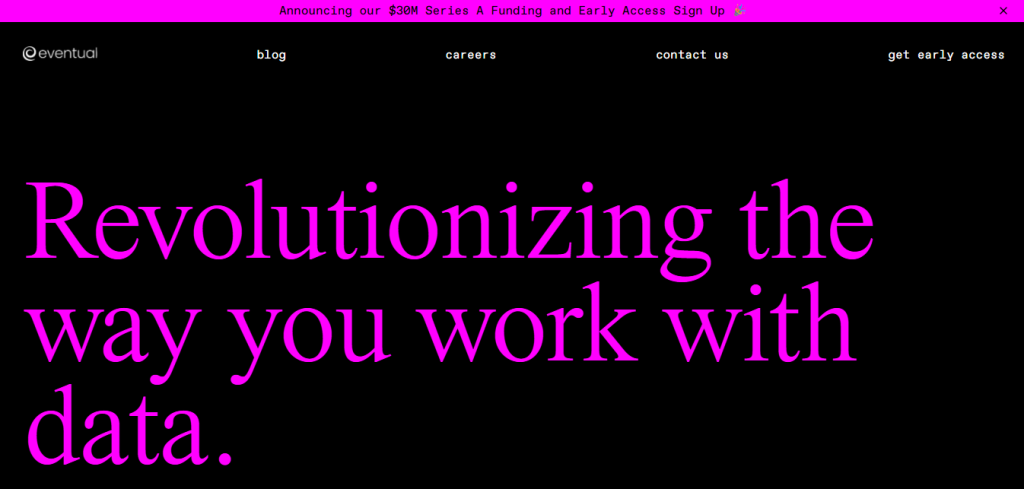Eventual Raises $20M Series A to Transform Enterprise Data Automation
July 10, 2025
byFenoms Startup Research

Eventual, a data automation platform, has announced the close of a $20 million Series A funding round led by top-tier investors including Felicis, M12 (Microsoft’s Venture Fund), Citi,Brittany Walker, Y Combinator, Essence VC, and Array Ventures. The round marks a significant milestone for the startup, co-founded by Sammy Sidhu and Jay Chia, as it aims to revolutionize how companies manage and extract value from their data pipelines.
With this new capital, Eventual is doubling down on its mission: to streamline enterprise data workflows using powerful automation tools that remove bottlenecks and allow organizations to make faster, more confident decisions.
Market Context and Why the Timing Works
The global data integration and intelligence market is projected to exceed $30 billion by 2026, with enterprise adoption of AI-driven workflows accelerating. A 2024 Forrester report indicated that 67% of large organizations cite “data silos” and “workflow friction” as the top blockers to scaling operational AI. Eventual’s focus on blending structured data with automated workflows speaks directly to this pain point.
Moreover, the shift toward data governance, compliance, and context-driven tooling is pulling the industry away from generalized BI dashboards and toward domain-specific intelligence layers - precisely where Eventual excels.
With backing from major institutional investors and early traction among enterprise clients, Eventual is not only solving today’s visibility problem, but shaping what decision-making looks like in the next decade.
Why This Funding Round Matters
This $20 million Series A validates the growing demand for low-lift, high-impact data infrastructure. With large enterprises already spending millions each year maintaining complex data stacks, a solution like Eventual offers a way to cut costs, boost productivity, and eliminate technical debt.
Investors in this round include:
- Felicis – Known for backing breakout tech startups early.
- M12 (Microsoft Ventures) – Signaling a strong belief in Eventual's ability to impact enterprise data tools.
- Citi – Representing growing enterprise demand for data modernization.
- Y Combinator – Backing founders with a vision for transformational change.
As Eventual expands its capabilities, the bigger picture becomes clear: the future of enterprise success will depend on removing the human bottlenecks in decision-making. The most competitive startups aren’t just “building fast” - they’re architecting environments where the right decision is made faster by default. And that requires frictionless data, intuitive automation, and a product ethos that puts autonomy first.
Founders building in data or AI should study what Eventual is doing: they’ve moved beyond “data as a product” and into “decision velocity as a service.” That shift - from visibility to actionability - is what separates commodity tools from platform-level winners.
Why Eventual’s Model Hits Different
Here’s the strategic insight founders can’t ignore: Founders building in infrastructure must start treating automation not as a feature - but as a default layer of the stack. Eventual's model embraces this mindset.
Too many startups are focused on building “data tools” instead of building workflow autonomy. Eventual's real innovation isn't in just managing data - it’s in enabling non-technical teams to orchestrate meaningful outcomes without needing to build or debug custom pipelines.
The lesson? The winners in enterprise SaaS are the ones who remove friction and unlock decision-making velocity. If your product isn't cutting time or clicks, you're already behind.
Why the Data Automation Industry Is Ripe for Disruption
Data automation sits at the intersection of two massive macro trends: the explosion of enterprise data and the shortage of technical talent. According to IDC, the global datasphere is expected to reach 175 zettabytes by 2025, yet the number of qualified data engineers is struggling to keep pace.
Additionally, Gartner predicts that by 2026, 75% of organizations will have adopted some form of automated data management to offset growing complexity and compliance needs. The shift is no longer optional - it’s a survival imperative.
Eventual taps into this urgency by offering a solution that scales with the organization without scaling overhead.
What’s Next for Eventual?
Armed with fresh capital, Eventual plans to expand its engineering and product teams, double down on R&D, and build out integrations with leading data platforms. The company is also launching early access for enterprise customers, inviting data-forward organizations to be part of the evolution.
The company has made it clear that its focus is on impact over features. That means continuing to prioritize resilience, security, and interoperability across all layers of the data stack.
With investors like Microsoft and Citi on board, and a clear path to scaling adoption among Fortune 500 companies, Eventual is well-positioned to become a category-defining player in data automation.









